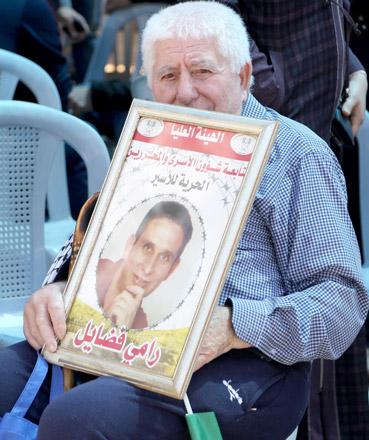You are here
Palestinians slam Israel for refusing talks with hunger strikers
By AFP - Apr 19,2017 - Last updated at Apr 19,2017

Palestinians hold the pictures of Palestinian prisoners, who are on hunger strike in Israeli jails, during a solidarity demonstration at Yasser Arafat Square in Ramallah, West Bank, on Wednesday (Anadolu Agency photo)
RAMALLAH, Palestinian Territories — Palestinian leaders on Wednesday denounced Israel's refusal to negotiate with Palestinians on hunger strike in Israeli jails, warning of a "new Intifada" if any of them die.
Some 1,500 Palestinian prisoners have joined the hunger strike that began Monday, according to Issa Qaraqe, head of detainees' affairs for the Palestinian Authority.
Contacted by AFP, Israel's prison service declined to comment on the number.
The hunger strike has been led by prominent prisoner and popular Palestinian leader Marwan Barghouthi, who is serving five life sentences over his role in the second Palestinian Intifada, or uprising.
He has been placed in solitary confinement in a separate prison over the strike and disciplinary measures have been taken against hunger strikers, though Israeli authorities have not provided details.
Qaraqe alleged that their lawyers and relatives were being barred from visiting them.
The prisoners have made a range of demands, from better medical care to access to telephones.
Around 6,500 Palestinians are currently detained by Israel, of those 62 are women and 300 are minors.
Around 500 are held under administrative detention, which allows for imprisonment without charge.
Palestinian prisoners have mounted repeated hunger strikes, but rarely on such a scale.
Qaraqe said the strike followed months of attempts at negotiations with Israeli authorities.
"If their demands are not met, more prisoners will join the strike," he said.
"We have asked the international community and the UN to intervene immediately."
He added that if prisoners die, “that could lead to a new Intifada”.
While a wave of Palestinian car, knife and gun attacks erupted in October 2015, the unrest has greatly subsided in recent months, though sporadic violence continues to occur.
On Wednesday, a Palestinian rammed a car into a bus stop at a tense junction in the occupied West Bank, wounding one person before soldiers opened fire and killed the assailant, Israel’s military said.
The Palestinian health ministry identified the man killed as Suheib Mashahrah, 21.
‘Tantamount to torture’
Israeli officials have vowed not to negotiate with the hunger strikers, with Public Security Minister Gilad Erdan on Tuesday calling them “terrorists and incarcerated murderers”.
Justice Minister Ayelet Shaked said that authorities “would not hesitate to implement the law which authorises the force-feeding of detainees”.
The controversial law passed in 2015 concerns hunger strikers whose life is deemed in danger.
Defence Minister Avigdor Lieberman said he wanted to take the approach of former British prime minister Margaret Thatcher, who publicly refused to accede to the demands of IRA hunger strikers in 1981, 10 of whom died.
Qaraqe accused Israeli officials, including Prime Minister Benjamin Netanyahu, of “incitement” against the prisoners.
Shawan Jabarin of Palestinian rights group Al Haq said invoking the force-feeding law would be “tantamount to torture” and could endanger the lives of those who have been ingesting only water and salt.
Barghouthi is popular among Palestinians, with polls suggesting he could win the Palestinian presidency.
While many Palestinians view the 57-year-old as a hero, Israelis point to the bloody suicide attacks of the second intifada of 2000-2005 and his role in the uprising.
He was convicted of attacks that killed five people, though declined to defend himself and did not recognise the court’s legitimacy.
For Palestinians, the prisons have become a stark symbol of Israel’s occupation.
Some 850,000 Palestinians have been incarcerated since the start of Israel’s occupation 50 years ago, Palestinian leaders say.
Palestinians allege that the imprisonments by an occupying force violate international law and have asked the International Criminal Court to examine the issue.
“Countries that have signed international accords must not allow the occupier to be above the law,” said Palestinian lawmaker Khalida Jarrar, recently released from prison after being accused of encouraging attacks against Israelis.
The last large-scale hunger strike was in February 2013, when 3,000 Palestinians refused to eat for one day in protest at the death of a fellow detainee.
Related Articles
OCCUPIED JERUSALEM — A nearly two-month hunger strike by a Palestinian detainee now in a coma may test a controversial new Israeli law on fo
RAMALLAH, Palestinian Territories — Israel has forbidden contact with the 1,500 Palestinian prisoners on hunger strike for the past eight da
OCCUPIED JERUSALEM — Israel vowed on Tuesday not to negotiate with hundreds of Palestinian detainees on the second day of a hunger strike le


















